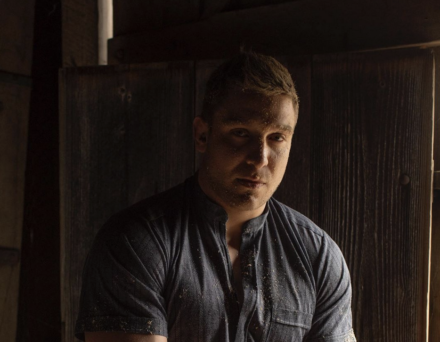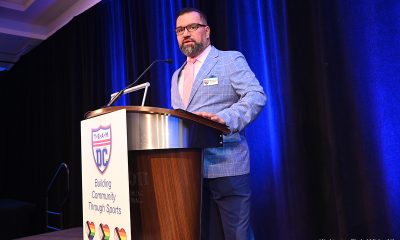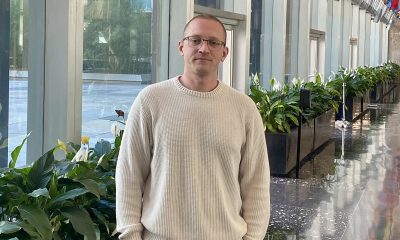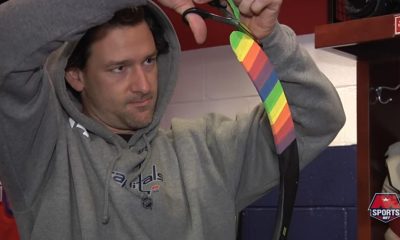Arts & Entertainment
Wrestler becomes first openly gay pro athlete in Switzerland

A Swiss wrestler has officially come out of the closet, making him the nation’s first openly gay professional athlete.
Curdin Orlik, who is a “swing” wrestling champion, revealed his sexuality to the Swiss publication The Magazine, according to OutSports.
The 27-year-old Orlik told interviewers, “I’d rather be free than fearful,” going on to add, “I am like that. I can’t help it. That’s how I was born.”
Swing wrestling, though unknown in most of the world, is a very popular Swiss sport with origins in a folk tradition of wrestlers competing against each other within a circle of sawdust. The contestants dress up to compete, rather than stripping down to a singlet. Champions in the sport become celebrities, leading to lucrative product endorsement deals – which is one reason, according to Orlik, he had previously remained in the closet.
However, homophobic comments experienced throughout his life also played a part.
“I heard things on the school building square [like] ‘you gay pig,’ ‘you faggot,’” he told reporters. “Or in soccer, ‘such a gay pass!’ Even when swinging [wrestling]. Sure, nobody really meant that, but if you’re like that yourself, you think, ‘Shit, that’s not a good thing.’ I thought: I don’t want to be gay.”
“But it’s me,” he declared. “Now it’s out.”
Switzerland passed a law in 2018 making homophobia and transphobia illegal, with penalties including up to three years in prison.
The young athlete also told The Magazine he had sought relationships with men through dating apps while he had been closeted, but that it was too difficult. He married a girlfriend, and the couple have a 2-year-old son together, but they have now separated – though Orlik is still part of his son’s life.
He told reporters, “For far too long I have pushed out who I really am. I am not someone who kisses in front of people, but I want to lie down with a man and be able to touch him. I always knew that I was gay, for sure since I was 12.”
After the interview was published, fans on social media showed overwhelming support for Orlik, who responded on Instagram by posting:
“Wow, I am overwhelmed by the large number of positive reactions I’ve gotten across all the various channels? With really awesome Feedback, I’m just starting out in a new, open and free period of life. Many thanks – from the very heart❤ A special thanks goes to my parents and everyone else who supported me in my family.”
A post shared by Curdin Orlik (@curdinorlik) on Mar 8, 2020 at 4:13am PDT
“For far too long I have pushed out who I really am,” Orlik laments. “I am not someone who kisses in front of people, but I want to lie down with a man and be able to touch him. I always knew that I was gay, for sure since I was 12.”
Since the article posted this weekend, Orlik has received overwhelming encouragement and support on social media. He thanked his supporters on Facebook, saying, “Wow, I am overwhelmed by the large number of positive reactions that you have sent me through a variety of channels. With your wonderful feedback, I’m now starting a new, open and free period of life.”
Welcome to the family, Curdin.

Team DC, the umbrella organization for LGBTQ-friendly sports teams and leagues in the D.C. area, held its annual Night of Champions Awards Gala on Saturday, April 20 at the Hilton National Mall. The organization gave out scholarships to area LGBTQ student athletes as well as awards to the Different Drummers, Kelly Laczko of Duplex Diner, Stacy Smith of the Edmund Burke School, Bryan Frank of Triout, JC Adams of DCG Basketball and the DC Gay Flag Football League.
(Washington Blade photos by Michael Key)




















The 2024 National Cannabis Festival was held at the Fields at RFK Stadium on April 19-20.
(Washington Blade photos by Michael Key)
















Covering the @NatlCannaFest at RFK Stadium for @WashBlade . Stop by the LGBTQ+ booth and pick up a paper if you are here. pic.twitter.com/is7hnsaPns
— Michael Patrick Key (@MichaelKeyWB) April 20, 2024
Theater
‘Amm(i)gone’ explores family, queerness, and faith
A ‘fully autobiographical’ work from out artist Adil Mansoor

‘Amm(i)gone’
Thorough May 12
Woolly Mammoth Theatre
641 D St., N.W.
$60-$70
Woollymammoth.net
“Fully and utterly autobiographical.” That’s how Adil Mansoor describes “Amm(i)gone,” his one-man work currently playing at Woolly Mammoth Theatre.
Both created and performed by out artist Mansoor, it’s his story about inviting his Pakistani mother to translate Sophocles’s Greek tragedy “Antigone” into Urdu. Throughout the journey, there’s an exploration of family, queerness, and faith,as well as references to teachings from the Quran, and audio conversations with his Muslim mother.
Mansoor, 38, grew up in the suburbs of Chicago and is now based in Pittsburgh where he’s a busy theater maker. He’s also the founding member of Pittsburgh’s Hatch Arts Collective and the former artistic director of Dreams of Hope, an LGBTQ youth arts organization.
WASHINGTON BLADE: What spurred you to create “Amm(i)gone”?
ADIL MANSOOR: I was reading a translation of “Antigone” a few years back and found myself emotionally overwhelmed. A Theban princess buries her brother knowing it will cost her, her own life. It’s about a person for whom all aspirations are in the afterlife. And what does that do to the living when all of your hopes and dreams have to be reserved for the afterlife?
I found grant funding to pay my mom to do the translation. I wanted to engage in learning. I wanted to share theater but especially this ancient tragedy. My mother appreciated the characters were struggling between loving one another and their beliefs.
BLADE: Are you more director than actor?
MANSOOR: I’m primarily a director with an MFA in directing from Carnegie Mellon. I wrote, directed, and performed in this show, and had been working on it for four years. I’ve done different versions including Zoom. Woolly’s is a new production with the same team who’ve been involved since the beginning.
I love solo performance. I’ve produced and now teach solo performance and believe in its power. And I definitely lean toward “performance” and I haven’t “acted” since I was in college. I feel good on stage. I was a tour guide and do a lot of public speaking. I enjoy the attention.
BLADE: Describe your mom.
MANSOOR: My mom is a wonderfully devout Muslim, single mother, social worker who discovered my queerness on Google. And she prays for me.
She and I are similar, the way we look at things, the way we laugh. But different too. And those are among the questions I ask in this show. Our relationship is both beautiful and complicated.
BLADE: So, you weren’t exactly hiding your sexuality?
MANSOOR: In my mid-20s, I took time to talk with friends about our being queer with relation to our careers. My sexuality is essential to the work. As the artistic director at Dreams of Hope, part of the work was to model what it means to be public. If I’m in a room with queer and trans teenagers, part of what I’m doing is modeling queer adulthood. The way they see me in the world is part of what I’m putting out there. And I want that to be expansive and full.
So much of my work involves fundraising and being a face in schools. Being out is about making safe space for queer young folks.
BLADE: Have you encountered much Islamophobia?
MANSOOR: When 9/11 happened, I was a sophomore in high school, so yes. I faced a lot then and now. I’ve been egged on the street in the last four months. I see it in the classroom. It shows up in all sorts of ways.
BLADE: What prompted you to lead your creative life in Pittsburgh?
MANSOOR: I’ve been here for 14 years. I breathe with ease in Pittsburgh. The hills and the valleys and the rust of the city do something to me. It’s beautiful, it’ affordable, and there is support for local artists. There’s a lot of opportunity.
Still, the plan was to move to New York in September of 2020 but that was cancelled. Then the pandemic showed me that I could live in Pittsburgh and still have a nationally viable career.
BLADE: What are you trying to achieve with “Amm(i)gone”?
MANSOOR: What I’m sharing in the show is so very specific but I hear people from other backgrounds say I totally see my mom in that. My partner is Catholic and we share so much in relation to this.
I hope the work is embracing the fullness of queerness and how means so many things. And I hope the show makes audiences want to call their parents or squeeze their partners.
-

 South America4 days ago
South America4 days agoDaniel Zamudio murderer’s parole request denied
-

 Maryland4 days ago
Maryland4 days agoMontgomery County police chief discusses arrest of trans student charged with planned school shooting
-

 Commentary5 days ago
Commentary5 days agoWorld ‘isn’t much different today’
-

 Theater4 days ago
Theater4 days ago‘Amm(i)gone’ explores family, queerness, and faith











